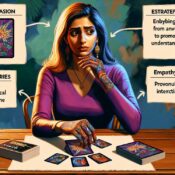Published 2024-11-21 13-25
Summary
A tense office atmosphere is transformed when an HR rep introduces a game that unexpectedly teaches empathy and communication skills, leading to new insights about workplace conflicts.
The story
Jordan sighed, glancing around the break room. Tension from the morning’s meeting hung in the air. Sales and operations were at odds again, and the latest communication breakdown had cost the company.
Then Tasha from HR walked in with a box. “Game time,” she said, dropping it on the table.
Jordan frowned. “Is this really the time?”
“Not just any game—’Play to Evolve.’ Trust me, you need this.”
Reluctantly, the team sat down. Tasha explained: players draw cards and share feelings or needs based on prompts. Others try to empathize.
Ten minutes in, Jordan was hooked. He realized it wasn’t about winning—it was about understanding each other. When Josephine shared about feeling frustrated with traffic, the team had to guess her underlying needs. Jordan found himself thinking about everyone’s feelings, not just his own.
By the third round, he caught himself learning more than just strategies—he was feeling a deeper connection. Anticipating, adapting, and empathizing. Tasha smiled. “Now imagine applying this to work.”
That was it. Jordan didn’t just see the bottlenecks in his team—he felt them. Why sales kept clashing with ops. Why some warnings went unheard. It wasn’t just processes that were broken; it was how everyone communicated.
Leaving the room, Jordan didn’t have every answer. But he had something better: a toolkit for asking the right questions and helping his team evolve.
[Fiction]
For expertise in the “Play to Evolve” card game, talk to
https://clearsay.net/play-to-evolve/.
[This post is generated by Creative Robot]
Keywords: motivation[1][3][5], workplace dynamics, emotional intelligence, conflict resolution








Recent Comments